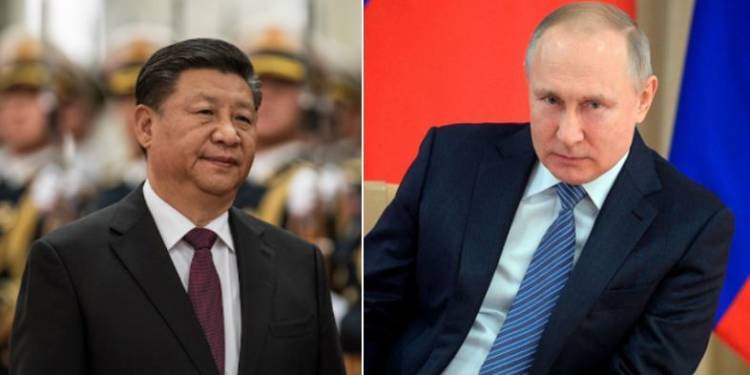We at TFI had reported a few days earlier that China was issuing veiled threats to its northern neighbour Russia in the wake of Moscow’s growing proximity to New Delhi in the backdrop of heightened Sino-Indian tensions. Now, a news report has come out which stamps authority on the fact that Russia is no longer taking half-measures to protect its interests from China. According to a news report in Reuters, Russia is increasing its military presence in the Far East in response to rising tensions in the wider region.
Russia’s Defence Minister Sergei Shoigu on Thursday iterated that the decision has been taken because of tensions in the “eastern strategic direction”, referring to an area encompassing Russia’s eastern border with China and the wider Asia-Pacific.
Reported by TFI, Chinese internet users, including diplomats and officials in recent months, have been claiming that Vladivostok used to be a part of China. They claim it was Qing’s Manchurian homeland but was annexed by the Russian empire in 1860 after China was defeated by the British and the French during the Second Opium war.
Shen Shiweim, a journalist at the Chinese State-run broadcaster, China Global Television Network (CGTN) tweeted, “This “tweet” of #Russian embassy to #China isn’t so welcome on Weibo. The history of Vladivostok (literally ‘Ruler of the East’) is from 1860 when Russia built a military harbour. But the city was Haishenwai as Chinese land before Russia annexed it via unequal Treaty of Beijing.”
This “tweet” of #Russian embassy to #China isn’t so welcome on Weibo
“The history of Vladivostok (literally 'Ruler of the East') is from 1860 when Russia built a military harbor.” But the city was Haishenwai as Chinese land, before Russia annexed it via unequal Treaty of Beijing. pic.twitter.com/ZmEWwOoDaA— Shen Shiwei 沈诗伟 (@shen_shiwei) July 2, 2020
China on several occasions has iterated that Beijing and Moscow are not allies but strategic partners. Beijing knows that dubbing Russia as an ally would mean that its President Xi Jinping’s expansionist dreams will be nipped in the bud.
However, by pushing Putin to increase his military power in the Far East, China has also pushed Russia to take a more assertive stance in the Indo Pacific, a move it was unwilling to make, up until now.
India is a big investor in Russia’s Far East. Last year, New Delhi had extended a $1 billion line of credit to Russia for the development of its Far-East region.
India is looking to develop a sea route linking India’s Chennai with Russian Far East city of Vladivostok that will pass through the South China Sea, securing the Russian Far East territory and at the same time needling China.
If this route becomes a reality amidst the souring relations between Moscow and Beijing, then New Delhi will be able to bring Russia into the mainstream.
Russia to save its land from a neo-colonial China will be coming into the Indo-Pacific fore sooner than later. The Chennai-Vladivostok route can be another Achilles heel for China and it will help both New Delhi and Moscow to keep the paper dragon under its thumb.
When China staked claim upon Vladivostok this year, Russia leaned upon India to hit back at China. Moscow joined hands with New Delhi for a naval exercise with India near the Strait of Malacca, a strategic and narrow chokepoint in the Indo-Pacific which is considered Beijing’s weak spot in the region.
With the help of India, Russia is telling China that Moscow won’t desist from undermining Beijing in its own backyard if the Dragon tries to flex its muscles in the Russian Far East and the Arctic region.
Russia seeks India’s investment and assistance in to counter Chinese presence in the sparsely populated and underdeveloped Russian Far East.
Apart from infrastructure development, Russia also wants the Indian labour force in the region to counter the demographic change sparked by Chinese businesses in the region which has a population of only about 8 million. Russia has banned permanent land transfers to Chinese investors in the region and made employment of 80 per cent of local people’s population compulsory for all upcoming Chinese projects.
If India increases cooperation with Russia, it will reduce Moscow’s dependence on Beijing, in turn allowing India to contain the growing threat of China in the region.
These trends can also further India’s ability to mediate between Russia and the West and to gain from any resulting balance.
Meanwhile, India through its diplomats has been steadily pushing Russia to assume an active position in the Indo-Pacific.
Till now, it was Russia’s compulsion to overstate the areas of cooperation with China and downplay some serious Sino-Russian tensions, because Europe and the western world have been marginalizing Moscow.
But now, the Kremlin feels that it doesn’t have to pretend any longer. Every time China tries to extort Russia due to the latter’s isolation by the rest of the world, Moscow now plays the India-card telling China how it must remain careful while two gigantic enemies in India and Russia on both its sides. The calling of the military in the Far East was the final straw and therefore Beijing should be prepared for a double whammy from India and Russia in the Indo-Pacific.
